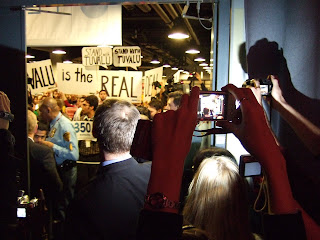 Demonstration in support of Tuvalu seen from inside the Plenary Room. Bella Center, Copenhagen, Denmark
Demonstration in support of Tuvalu seen from inside the Plenary Room. Bella Center, Copenhagen, DenmarkAll of you who follow the series of COP/Conferences on Climate change might be aware that the first week is lukewarm at best. For you who are not familiar with the proceedings of a U.N. meeting on Climate Change, it may be worth to take a brief detour.
It is usually in the second week that top brass (politicians, officials, and industry leaders) join the Conference. It is when they fly in from far flung corners of every continent, deliver their speeches and sign the deals that have been so laboriously (or not so) hammered out in the first week by bureaucrats and representatives of the respective countries. Thus, what some of us might perceive as the deciding moments, have already been agreed upon in the preceding days. In other words, the first week is one of closed-(and let's be fair, also opened-) doors meetings, and drafting.
In this first week, we have been saved from the apathy of marasmus by two rather unlikely events. The first one regards the leaking of a proposal, allegedly drafted by the U.S., the U.K. and Denmark, our host country. This leaked document has spurred indignation among (some groups of) developing nations and put the COP in disarray. Were I to summarize their concern, I would do so by firstly identifying three guiding axes of the leaked draft.
The first one raises a rather thorny issue: what shall we call developing countries? This so-called "Danish Text" establishes a clear distinction between least developed countries (LDC) and“other” developing nations (emerging economies), and posits most of the resources in the way of financing and technology-transfer are to be directed towards the LDC. Well, is this fair? Are advanced economies (a.k.a. Annex I Parties, in the COP lingo) ducking their responsibility? Maybe a more fruitful inquire would be: can they do so and get away with it? Will they amass the necessary support? Do they have the political muscle to do so? The next days might shed some light on these questions. As some say, the devil is in the detail.
The second buzz lies in the way countries are to reduce their GHG emissions. The text would obligate all parties (countries) to peak their global emissions as soon as possible and no later than 2020. Now, what is all the fuss about you might ask? Opposition rises from how business and negotiations have been conducted so far. This echoes another issue well discussed in the third day of the convention: some of the poorest countries in Africa - as one would expect – are stepping to the fore and demanding a more just and equitable distribution of financial resources for climate change mitigation (i.e. India and China are not to be given the larger share of the funds).
Least, but by no means last, comes the target in global temperature increase. The text sets a 2 degrees Celsius as the ceiling to Global Warming. It goes without saying that some countries that have been shouting at the top of their lungs that a 1.5 degree increase is the maximum acceptable limit. You guessed it, groups such as SICA (Sistema de Integracción Latinoamericano) and AOSIS (Alliance of Small Island States) were far from content.
Now how has this impacted the Conference? I wouldn’t doubt it for a second. Tuvalu, a Pacific island-nation has (once again) made itself clearly heard and said that anything beyond 1.5 degree Celsius and a concentration of GHG higher than 350 parts per million is utterly nonsensical. And later in the day they have also called for the suspension of the convention! This has led to massive manifestations in support of Tuvalu which indeed has caused the COP to be suspended (at least for a few hours).
The final question here is: if it is crucial solutions be commensurate with the challenges one faces and challenges are defined by the power to address them, who stands with Tuvalu?
No comments:
Post a Comment